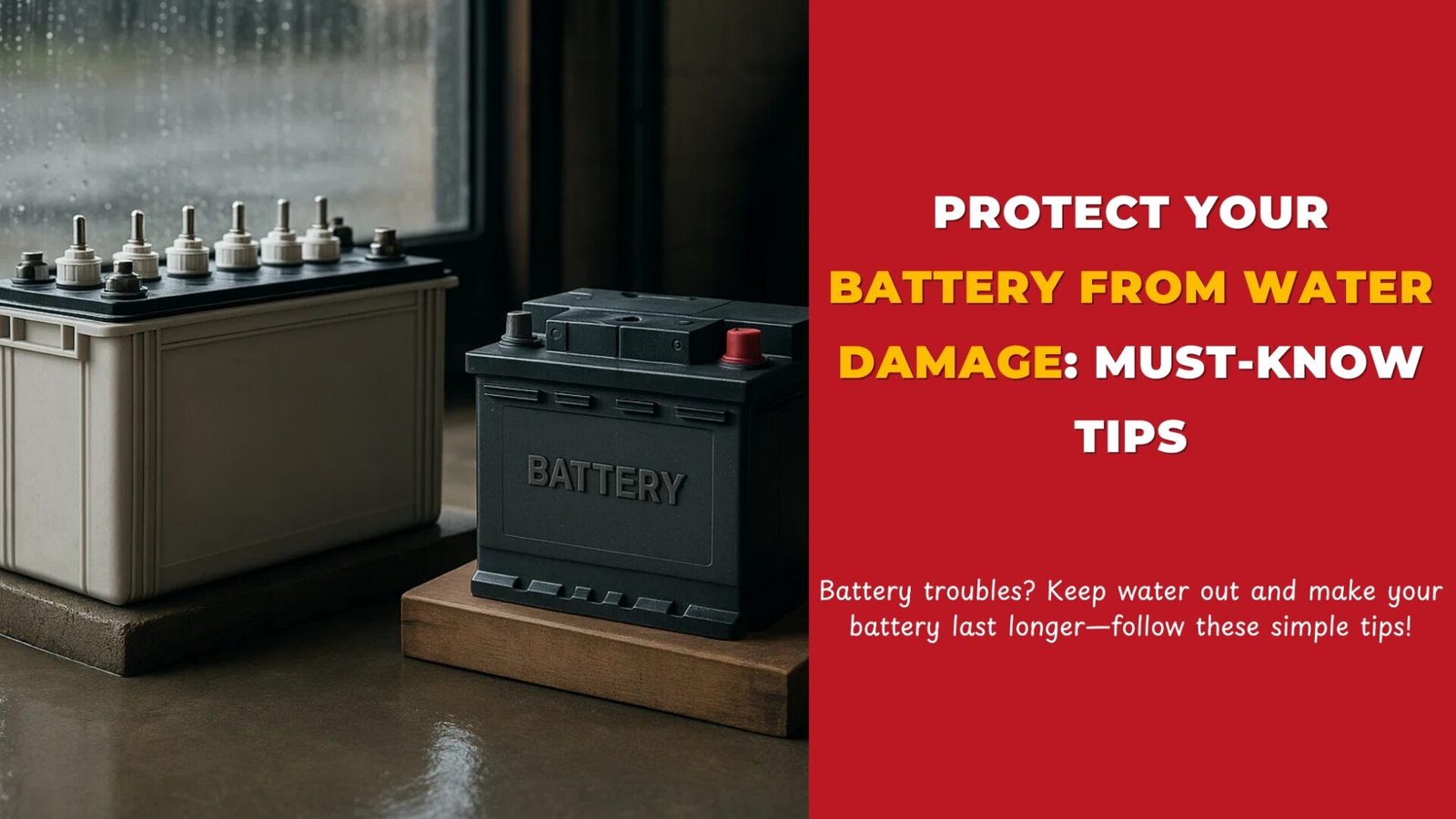Batteries have become essential to modern living, powering everything from inverters during frequent power cuts to cars and bikes we drive daily. As Udaipur and similar regions see rising demand for reliable backup power and vehicle batteries, ensuring their longevity is crucial for every homeowner and driver. One of the most common—and preventable—issues is battery water damage. With simple battery maintenance tips, you can protect your battery from water damage and avoid costly or even dangerous problems.
Why Water Damage Is Dangerous for Batteries
Water might seem harmless, but when it comes in contact with batteries, it can cause serious trouble:
- Corrosion: Battery terminals exposed to water develop rust and corrosion, affecting their ability to send and receive power efficiently.
- Short Circuits: Moisture can create a path for electricity where it shouldn’t go, leading to short circuits and reduced battery life.
- Complete Failure: Persistent water intrusion may cause a battery to lose all function, forcing costly replacements.
- Safety Hazards: In rare cases, water damage can create the risk of explosions or fires by disturbing the delicate chemistry inside the battery.
Keeping batteries dry isn’t just about performance—it’s about safety, reliability, and extending your investment.
Common Causes of Water Damage in Batteries
Understanding what puts batteries at risk helps you stay proactive with battery care tips and inverter battery protection:
- Rainwater Seepage: In homes or vehicles, poorly sealed areas allow rainwater to reach battery setups, especially during monsoons.
- Improper Outdoor Storage: Storing batteries outdoors without covers exposes them to rain, dew, and high humidity.
- Accidental Spills: Careless cleaning or accidental splashes from buckets can drench batteries, particularly in tight spaces.
- Faulty Battery Casings or Loose Lids: Cracked casings or lids not properly secured allow water to seep in unnoticed.
- Lack of Proper Enclosure: Placing inverter batteries in open or damp areas without a cabinet raises the risk of moisture exposure.
Being mindful of these everyday risks helps you take action before trouble starts.
Must-Know Tips to Prevent Water Damage
🟢For Inverter Batteries
- Elevate or Cover: Always place inverter batteries in elevated or covered spaces to avoid accidental exposure to water, especially on the ground floor.
- Use Insulated Cabinets: Invest in battery cabinets with insulation that shields the battery from any moisture or accidental splashes.
- Keep Away from Water Sources: Never install batteries near bathrooms, kitchens, or other places where water use is frequent.
- Routine Checks: Regularly inspect battery locations for signs of leaks, dampness, or condensation, especially during monsoon months.
🟢For Vehicle Batteries
- Park Smart: Whenever possible, park your car or bike in a garage, carport, or under solid cover during storms or rains.
- Wipe Terminals: After exposure to rain, wipe and clean battery terminals with a clean, dry cloth to remove any moisture.
- Avoid Flooded Roads: Steer clear of driving through deep water, as this can cause water to splash up and reach the engine compartment and battery.
🟢General Tips
- Corrosion Protection: Apply corrosion-resistant sprays or petroleum jelly to terminals as a protective barrier.
- Inspect Battery Casing: Regularly check for cracks, holes, or other damage in the battery casing which could allow water in.
- Waterproof Accessories: Use waterproof covers or battery boxes, especially for batteries kept outdoors or in semi-enclosed spaces.
- Educate Family Members: Ensure all family members handling batteries know the basics of careful handling and the risks of water exposure.
By staying proactive with these tips, you’ll protect your battery from water damage and ensure that your batteries stay dry, safe, and serve you longer.
What to Do If Your Battery Gets Wet
Despite your best efforts, accidents can happen. Here’s what to do if your battery gets wet:
- Safety First: Immediately disconnect power to avoid shock or short circuits.
- Avoid Bare Hands: Never touch wet batteries—especially near live wires—with bare hands.
- Dry Thoroughly: Use a dry cloth to clean the surface and terminals. Do not use heat sources to speed up drying.
- Inspect for Damage: Check for corrosion, cracks, swelling, or leakage.
- Call a Professional: If you notice swelling, leakage, or severe damage, do not reuse the battery. Instead, seek help from certified technicians for a thorough assessment and safe handling.
Prompt action can often save a battery or prevent a small issue from becoming a dangerous one.
Final Thoughts
Water damage is a leading cause of battery failure, but it’s also one of the easiest to prevent with a little care and foresight. Remember: batteries are long-term investments. By making regular maintenance and waterproofing a habit, you not only protect the battery but also your wallet and safety.
Want to extend your battery’s life and avoid sudden failures? Start protecting it today with these simple tips. For expert advice or waterproof battery enclosures,
Vaibhav Enterprises helps you keep your batteries safe, dry, and performing at their best in Udaipur.
Follow us on Instagram: @vaibhaventerprisesudaipur

